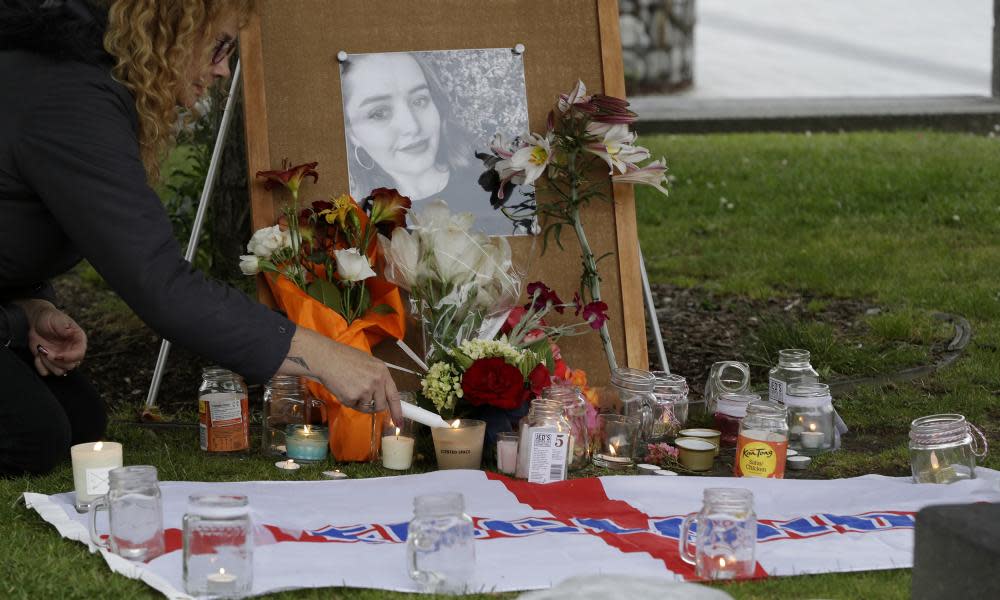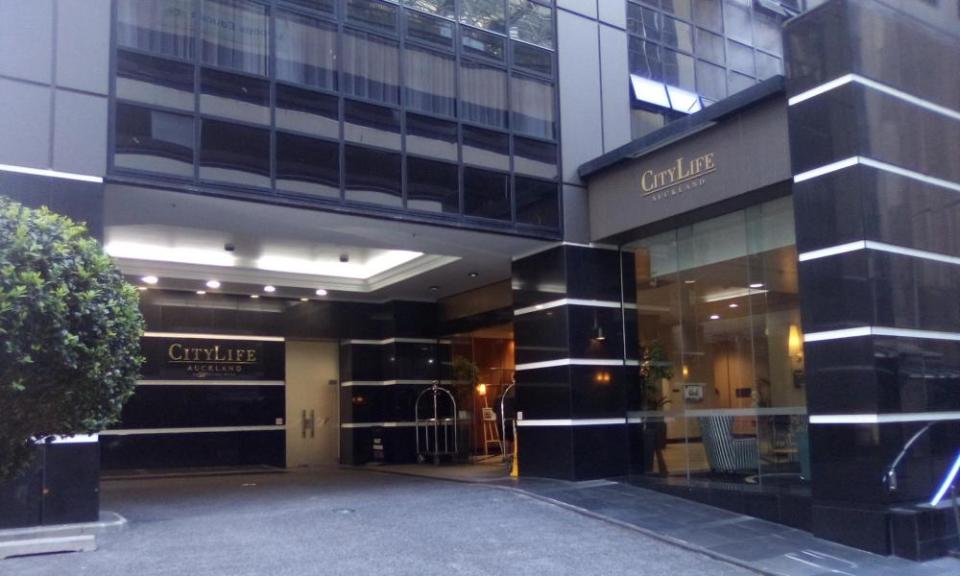'She should have been safe here': how Grace Millane's murder shocked New Zealand

When Grace Millane’s parents bid their daughter farewell on her round-the-world adventure in September 2018, they never imagined that one day they would be following her to New Zealand – first on a missing person’s hunt, and a second time to attend a murder trial.
David Millane arrived first, in early December 2018, making a public plea for information as to the whereabouts of his daughter, who had disappeared on the eve of her 22nd birthday.
Millane, from Essex, cried as he pleaded for her safe return. But it was already too late. Her body – bruised, strangled and contorted into a cheap suitcase – had been buried in a shallow grave in a bushland area west of Auckland.
The man who killed her – who cannot be named for legal reasons – was busy setting up Tinder dates and bleaching the carpet in his hotel room to remove her blood stains.
“Only two people know what happened in that room,” said Robin McCoubrey, who opened the prosecution’s case in Grace Millane’s murder trial in the Auckland high court three weeks ago. “One of them can’t tell us, and the other hasn’t told the truth about what happened.”
“That room” was the accused’s meagre rental at the CityLife hotel, a cramped space filled with cheap furniture and stained curtains. What occurred there on the night of 1 December has gripped New Zealand and shaken the country’s belief in itself as a safe, welcoming place for visitors.
“Your daughter should have been safe here, and she wasn’t, and for that I am sorry,” said the prime minister, Jacinda Ardern, blinking back tears, after Millane’s body was found.
What was undisputed, from early on, was that Millane died in the CityLife hotel room after a date with the accused.

Millane died, two forensic pathologists confirmed, from manual strangulation at the hands of the accused, an act so violent blood vessels burst in her face and her left eye, and her nose bled profusely.
The strangulation was not as the defence claimed “an accident” – a moment of passion during consensual erotic strangulation that had tragically gone too far – but murder.
Her death, three medical experts confirmed, would have taken between five and 10 minutes, and required sustained strength, and unrelenting pressure. Death from erotic asphyxiation is incredibly rare, they attested, with both forensic pathologists saying they had never seen a case.
The forensic pathologist Dr Simon Stables, who examined Millane’s body, described the deep bruising on her upper arms, neck and left shoulder as “typical of restraint”.
The lack of defensive wounds was because she was unable to fight back against her attacker, the prosecution said, either because she was so tightly held down, perhaps by his knees, or because intensive choking had already caused her to fall unconscious.
There was “extensive evidence” of bruising on the left side of Millane’s neck, in what Stables described as a “significant injury”.
“This bruising wouldn’t occur with gentle pressure on the neck … it takes quite a bit of effort,” Stables said unequivocally.
The Millane parents arrived early each day to Auckland high court, traipsing up the gloomy concrete staircase that led to courtroom 11, a bare, bureaucratic space devoid of warmth or character.
Gillian Millane cried repeatedly as the most intimate details about her daughter’s private life were exposed, while David stared into the middle distance, holding his wife’s hand, or draping an arm around her waist as she sobbed, sometimes doubled over. Neither of them ever looked at the accused, dressed each day in a navy suit, sometimes sniffling with a tissue held to his nose, but mostly smirking, or looking bored.
Throughout the three-week ordeal they maintained a quiet dignity and reserve.
Ten minutes after the guilty verdict was read out, the Millanes walked outside the high court hand in hand, Gillian sobbing quietly as her husband gave a prepared statement, apologising to the media for not being able to read very clearly through his tears.
“Grace was a beautiful, talented, loving daughter. Grace was our sunshine and she will be missed forever,” David said.
“She did not deserve to be murdered in such a barbaric way.”
By their side, at all times, they have been flanked by DI Scott Beard, who has a daughter Grace Millane’s age, and the family liaison officer Detective Toni Jordan, who travelled to the UK this year to gather evidence for the murder trial. Jordan was also instrumental in bringing the accused in for his first interview with police on 6 December, giving chase as he left the CityLife hotel.
It is a case that has had consent at its core.
The crown prosecutor, Brian Dickey, said: “This case is about being strangled to death. You can’t consent to your own murder.

“He must have known what he was doing. She must have gone limp, some time before death. And then he must have carried on.
“There is powerful evidence in this case that Grace was murdered … because the person doing that must have known that they were hurting her, causing her harm, that might well cause her death, but they were reckless and carried on, and she died.”
In New Zealand, a murder verdict is reached if premeditation to kill can be proved – or, in this case, “reckless intent”, an act so violent that doing it puts someone else’s life in catastrophic danger.
“No person under our law may consent to their own death,” Judge Simon Moore told the jury as he asked them to consider their verdict. “Consent can be revoked at any time.
“If Miss Millane was rendered unconscious by the pressure applied to her neck but the accused continued after she passed out … she was no longer consenting.”
If the accused had even briefly released his grip on Millane’s neck, her youth and good health would have probably allowed her to recover, medical experts said. But he did not let go.
The accused’s conduct following Millane’s death was also damning, and was evidence, the prosecution argued, of a cold, remorseless killer, unmoved by a dead woman lying on his floor.
Extensive CCTV evidence showed the accused displayed no signs of being “panicked” in the hours following Millane’s death, as the defence argued, but instead demonstrated “focus and nonchalance” as he travelled around Auckland in a hire car buying a large suitcase to dispose of her body, cleaning products to remove blood stains from his room, and setting up another Tinder date while Millane’s body remained in his room.

Dickey told the jury: “He was cool, calm, in control … it speaks to someone who was entirely without regret.”
In the hour after her death the accused also took intimate pictures of her corpse, Googled “Waitakere Ranges”, where her body was later found and watched eight clips of child sexual abuse.
“He has this complete interest in sexual domination. It is at risk of women’s lives and it is terrifying and he knew what he was doing,” Dickey said. “He has sexualised the death of Grace Millane for his purposes, and only a person who was unconcerned about that death, and causing that death, could do that.”
Following the guilty verdict, the accused showed no emotion and was immediately escorted from the courtroom by two police officers. He will be sentenced in February.
In the public gallery, the Millanes clutched each other’s hands and gulped for air as they cried. As their tears flowed, so too did the tears of the detectives either side of them, and then members of the jury, holding handfuls of tissues as they filed out.
It is a trial that has gripped and disturbed New Zealand. In the week following the discovery of Millane’s body, mass candlelit vigils were held nationwide, and thousands of people marched in the street, calling for an end to violence against women. One in three New Zealand women has experienced violence at the hands of an intimate partner, one of the highest rates in the OECD.
David Millane was spotted at the Auckland vigil last December, quietly moving through the crowd as they sang Amazing Grace. His daughter’s body is buried in a small graveyard in the town of Wickford, Essex, but his daughter would “always be a Kiwi” he said. The couple are returning to the UK, Millane said outside the Auckland high court, squeezing his wife’s hand tightly.

“We must return home and try to pick up the pieces of our lives, day to day, without our lovely Grace.” David said.
“[The murder verdict] will not reduce the pain and suffering we have had to endure over the past year. Grace was taken away from us in the most brutal fashion a year ago and our lives have been ripped apart. This will be with us for the rest of our lives … she will be missed forever. She did not deserve to be murdered.”

 Yahoo News
Yahoo News 
